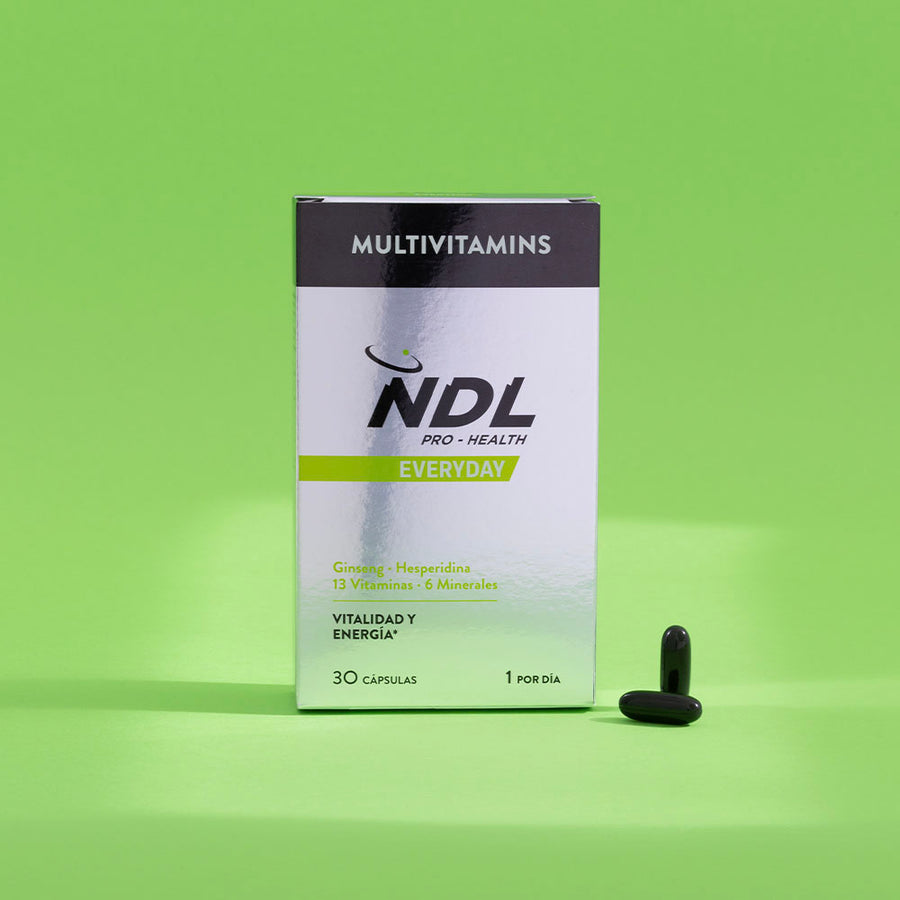Featured Products

Multivitamins and Minerals
See productIn a world where a fast-paced lifestyle, stress, and unbalanced diets are increasingly common, many people turn to vitamin complexes as a way to support their overall health. These supplements combine various essential vitamins and minerals in a single formula, designed to cover potential nutritional deficiencies and contribute to the proper functioning of the body.
Although a varied diet should be the main source of nutrients, it is not always easy to reach optimal levels of all the necessary vitamins. Factors such as age, diet type, physical activity, or certain medical conditions can increase the demand for micronutrients. In these cases, a good vitamin complex can make a difference in terms of energy, concentration, immune system, and overall well-being.
This article will help you choose the best multivitamin according to your personal needs, as well as explain exactly what it is and what types exist.
What is a vitamin complex?
A vitamin complex is a dietary supplement that combines several vitamins – and, in many cases, minerals as well – in a single capsule, tablet, sachet, or liquid form. Its main goal is to complement the diet to ensure the body receives all the micronutrients necessary to function properly.
Unlike individual vitamins, such as vitamin D or vitamin B12, complexes offer a comprehensive solution that makes it easier to cover multiple needs at the same time. This combination can be general (multivitamins for daily use) or formulated for specific profiles such as women, men, older adults, or athletes.
Thanks to their practical format and ease of incorporation into daily routines, vitamin complexes have become one of the most consumed supplements worldwide.
Benefits of taking a vitamin complex
Taking a vitamin complex can provide numerous benefits, especially when the daily diet does not cover all nutritional requirements. Although they should not replace a balanced diet, multivitamins act as support that strengthens health and prevents silent deficiencies that, over time, can lead to more serious problems. The main benefits are:
- Immune system support: vitamins such as C, D, A, and minerals like zinc and selenium are essential to keep the immune system in optimal condition. A complete formula can help prevent frequent infections or speed up recovery during periods of greater wear and tear.
- More energy and vitality: B vitamins (especially B1, B6, and B12) are involved in energy metabolism. A deficiency can cause fatigue, mental tiredness, or lack of concentration. The vitamin complex helps maintain physical and mental energy throughout the day.
- Improved bone and muscle health: calcium, vitamin D, and magnesium are essential to keep bones and muscles strong. At stages such as menopause or old age, these nutrients become especially important to prevent problems like osteoporosis or cramps.
- Healthier skin, hair, and nails: biotin, zinc, and vitamins A and E play a key role in the health of epithelial tissues. Proper supplementation can improve the appearance of the skin, strengthen nails, and reduce hair loss.
In short, vitamin complexes not only help prevent nutritional deficits but can also enhance different aspects of health according to individual needs.

How to choose the best multivitamin complex for you?
Choosing the best vitamin complex does not necessarily mean opting for the most expensive or the one with the most ingredients, but rather the one that best suits your personal needs, your lifestyle, and your health status. Here are some key tips to help you make the right choice:
-
According to your age and life stage:
- Active adults: may require more B vitamins and antioxidants.
- People over 50: often benefit from extra vitamin D, B12, and calcium.
-
According to your lifestyle:
- If you follow a vegetarian or vegan diet, look for complexes that include B12, iron, zinc, and plant-based omega-3.
- If you regularly practice sports, you will need a higher intake of magnesium, B vitamins, and antioxidants.
- During periods of stress, fatigue, or lack of sleep, the body demands more vitamin C, B complex, and natural adaptogens like rhodiola or ginseng.
-
If you have medical conditions or are taking medication:
Always consult a health professional. Some supplements can interact with medications or may not be recommended in certain cases (such as kidney problems, liver issues, or hormonal treatments).
-
Composition and form of presentation:
- Look for complete formulas with a good proportion of key vitamins and minerals, without unnecessary fillers.
- Choose forms with high bioavailability: for example, magnesium citrate instead of magnesium oxide, or methylcobalamin instead of cyanocobalamin (B12).
- Choose the format that is most convenient for you: capsules, tablets, powder, liquid, or gummies.
-
Verify product quality:
- Look for brands with a good reputation, quality certifications (GMP, ISO, third-party analysis), and transparency in labeling.
- Check if the product is free of common allergens such as gluten, lactose, or soy, if it is vegan-friendly, or free from artificial additives.
Frequently Asked Questions
To resolve common doubts about the use of vitamin complexes, we have compiled some of the most frequently asked questions by users before starting to take them:
1. Is it good to take a vitamin complex every day?
Yes, as long as it is formulated for daily use and adapted to your needs. Many complexes are designed as constant support, not as a temporary treatment. Still, it is advisable to have periodic check-ups and consult a health professional if you plan to take them for long periods.
2. Can there be side effects from taking too many vitamins?
Yes. Although many water-soluble vitamins (such as C or B vitamins) are excreted in urine if taken in excess, others like A, D, E, and K (fat-soluble) can accumulate in the body and cause toxicity. Therefore, it is important not to exceed the recommended doses and avoid “over-supplementation” without control.
3. How long should a vitamin complex be taken?
It depends on each case. Some people take them continuously as part of their routine, while others only use them during specific periods (winter, exams, intense training, etc.). Ideally, adapt it to your goals and take breaks if indicated by the manufacturer or your doctor.
4. Do vitamin complexes replace a good diet?
No. They are a complement, not a substitute. A varied diet is still the best source of nutrients. Supplements are meant to reinforce, not replace, good dietary habits.
In conclusion, choosing the best vitamin complex is not just a matter of brands or trends, but knowing your own needs and finding a formula that truly helps you feel better and perform at your best. Whether you seek more energy, immune support, or occasional help for a demanding stage, there is a multivitamin suitable for you.

From the NDL Pro-Health team we will provide you with tips to maintain a healthy lifestyle. Sharing knowledge and product recommendations to offer optimal solutions for your daily routine, for your workouts and subsequent recovery, all with the goal of helping you achieve physical and mental wellness.

















